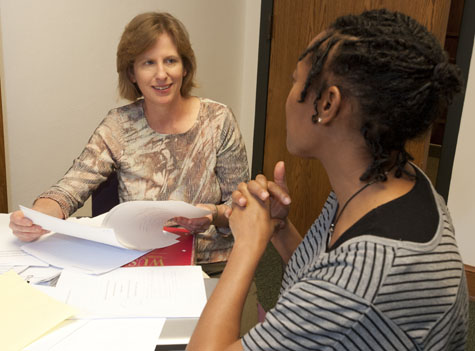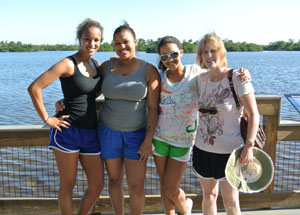
(Credit: David Kilper)
If you were a wandering shepherd and suddenly the government began parceling out land your flock grazed to your fellow citizens, would you be better off as a landowner instead?
That’s the question that Carolyn Lesorogol, PhD, pondered after Kenya began to distribute property in the land registration movement of the 1970s. Lesorogol, an associate professor of social work in the Brown School and adjunct in anthropology in Arts & Sciences at Washington University in St. Louis, decided to study the question in 2000.
She worked and lived among the Samburu in northern Kenya, cataloging one community’s transition from pastoralists living on communal land to individual landowners. Most of the residents in the community about 300 miles north of Nairobi nearly gave up their right to individually own land in the government apportionment — that is, until one group who had received education, military or job experience began seeking out the best parcels for themselves. It woke up the populace.
After a prolonged conflict between pro- and anti-privatization factions, the residents decided they should subdivide the land equally among all the families, which meant change to their semi-nomadic ways, including incorporating a more agrarian lifestyle.
Lesorogol, who first came to the region as an undergraduate study-abroad student from Harvard University, expected privatization to work against the Samburu economically.
“I suspected they were worse off,” she says. “But the analyses showed they weren’t. In 2000, people in Siambu, the (Samburu) community that privatized, were better off in terms of livestock wealth than people in a similar community that remained communal.”
But today, she says, both communities are similar in terms of wealth and income.
“Privatization has not been the disaster predicted by some, nor has it been an absolute boon to the inhabitants,” she wrote in a 2005 paper titled “Privatizing Pastoral Lands: Economic and Normative Outcomes in Kenya,” published in the journal World Development.
http://youtu.be/aWBCQQ1h_ToCarolyn Lesorogol, PhD, associate professor at the Brown School, discusses her research on land privatization in Kenya.
One of the reasons there was at least an initial improvement in wealth for the Siambu community was that members didn’t sell their land and about two-thirds of them began to grow crops that they could eat or sell if they had excess.
“They historically looked down on people who were growing crops,” Lesorogol says. “But that stigma is pretty much gone in that community now.”
The data from Lesorogol’s work can’t necessarily be applied to other countries because the specific conditions in Siambu, such as dividing the land equally, don’t exist uniformly elsewhere, she says.
“The message is not that this exact outcome can be predicted in other places, but that we need to focus on the details of property-rights formation and that it has complex outcomes that we should study,” Lesorogol says.
Edward Lawlor, PhD, dean of the Brown School and the William E. Gordon Distinguished Professor, praised Lesorogol’s research.
“Carolyn’s work exemplifies the very best of social science and an exceptional dedication to social justice,” he says. “In her search to find ways to create collective solutions for providing basic life necessities and opportunities such as employment, food and shelter, Carolyn adeptly combines ideas from anthropology, economics, experimental psychology, game theory, institutional social science and sociology.
“This passion for understanding the complex social and economic problems confronting rural and urban communities in Africa is evident in both her research and in the courses that she teaches on international development theory and practice,” he says.
“On top of her outstanding scholarship and teaching, she is an important faculty leader in our school.”
A tangible benefit
Since her examination of Kenyan land privatization, Lesorogol has also returned to her rural development roots and started a new project with the Samburu promoting the adoption of an improved breed of dairy goats, the Toggenburg.

“I missed the development work and doing something that had a tangible benefit,” she says. “The community members wanted something that had a tangible benefit, too.”
Lesorogol, with support from Washington University’s Center for New Institutional Social Sciences, has helped the Samburu obtain Toggenburgs to crossbreed with local goats. Toggenburgs produce up to eight times more milk than the native variety, which could be consumed by the household and also sold to provide income for the owners.
“I knew from the research that milk production and per capita ownership of livestock have gone down, and the fact that people have these private plots means they have the system to raise the goats,” she says.
So far, Lesorogol and her students have worked with the Siambu Dairy Goat Self-help group to provide 30 families with goats.
The crossbred goats should, within two to three generations of offspring, yield a more productive, heartier breed. That new breed will help relieve some of the economic burden on the Samburu, she says.
Planning process and interventions
For a woman who grew up, as she says, in a privileged upbringing in the upscale Frontenac municipality of the St. Louis area, becoming enamored of rural Kenya with its lack of electricity, paved roads and amenities of big city life seemed unlikely.
But that’s exactly what happened to Lesorogol as an undergraduate, and then in her first job teaching English and her next working for the Samburu District Development Program (SDDP), a Kenyan-German development collaboration.
She not only learned Swahili but also the Samburu language as well as the culture and values of the region. She also married a Samburu man and started her family there.
“It’s a beautiful country,” she says. “People are nice and hospitable. The resilience of the people in the face of really difficult circumstances and how they use their social ties and their community strengths to survive, I wanted to understand how that works.”
In her seven years working in development for the SDDP, Lesorogol greatly expanded the program, going from one office to three and supervising all the employees working in 36 different communities with up to 3,000 people each.
The organization focused on participatory planning with communities, including designing and implementing livestock restocking programs, water supply, drought recovery and other infrastructure needs.
“We really built the program with a participatory approach as opposed to ‘We have the answers,’ which I don’t believe in,” she says. “It’s what I teach now, the planning process and interventions.”
Someday, Lesorogol hopes to delve into why some of the SDDP efforts failed and discover why programs that did flourish were successful. That curiosity is what led her back to Samburu after her SDDP stint.
“Not everything works, and not everything is sustained,” she says. “Long-term follow-up is one of the weaknesses in development in general.”
Continuing a family tradition
In the meantime, Lesorogol will continue raising her three daughters with husband, Leretin, and pursue her hobby of dressage horseback riding. She tries to ride once a week at a stable in Wentzville, Mo., and occasionally competes in dressage shows. She even has won a few ribbons in the shows.
She also is continuing a family tradition of educating Washington University students.
Lesorogol’s father, Stuart Kornfeld, MD, and brother, Kerry Kornfeld, MD, PhD, are professors in the School of Medicine. Her late mother, Rosalind Kornfeld, PhD, was a professor of biochemistry and of medicine and an early woman faculty member who was a founder of the WUSTL Academic Women’s Network. Her grandfather, Max Kornfeld, was a professor in the dental school.
“I didn’t expect to be back here,” Lesorogol says. “I thought I would go away, work with ‘real’ people and change the world. But you don’t know where you’ll go when you’re 21.
“It’s been a good transition,” she says, smiling.
Fast facts about Carolyn Lesorogol
Education: BA, social studies, Harvard University; MA, African studies, University of California, Los Angeles; MA, anthropology, Washington University; PhD, anthropology, Washington University
Family: Husband, Leretin Lesorogol, and three children: Sarah, 20, Jennifer, 17, and Emily, 11
Recent books she has read: That Used to Be Us by Thomas L. Friedman and Michael Mandelbaum; Alone Together: Why We Expect More from Technology and Less from Each Other by Sherry Turkle; and Unaccustomed Earth by Jhumpa Lahiri